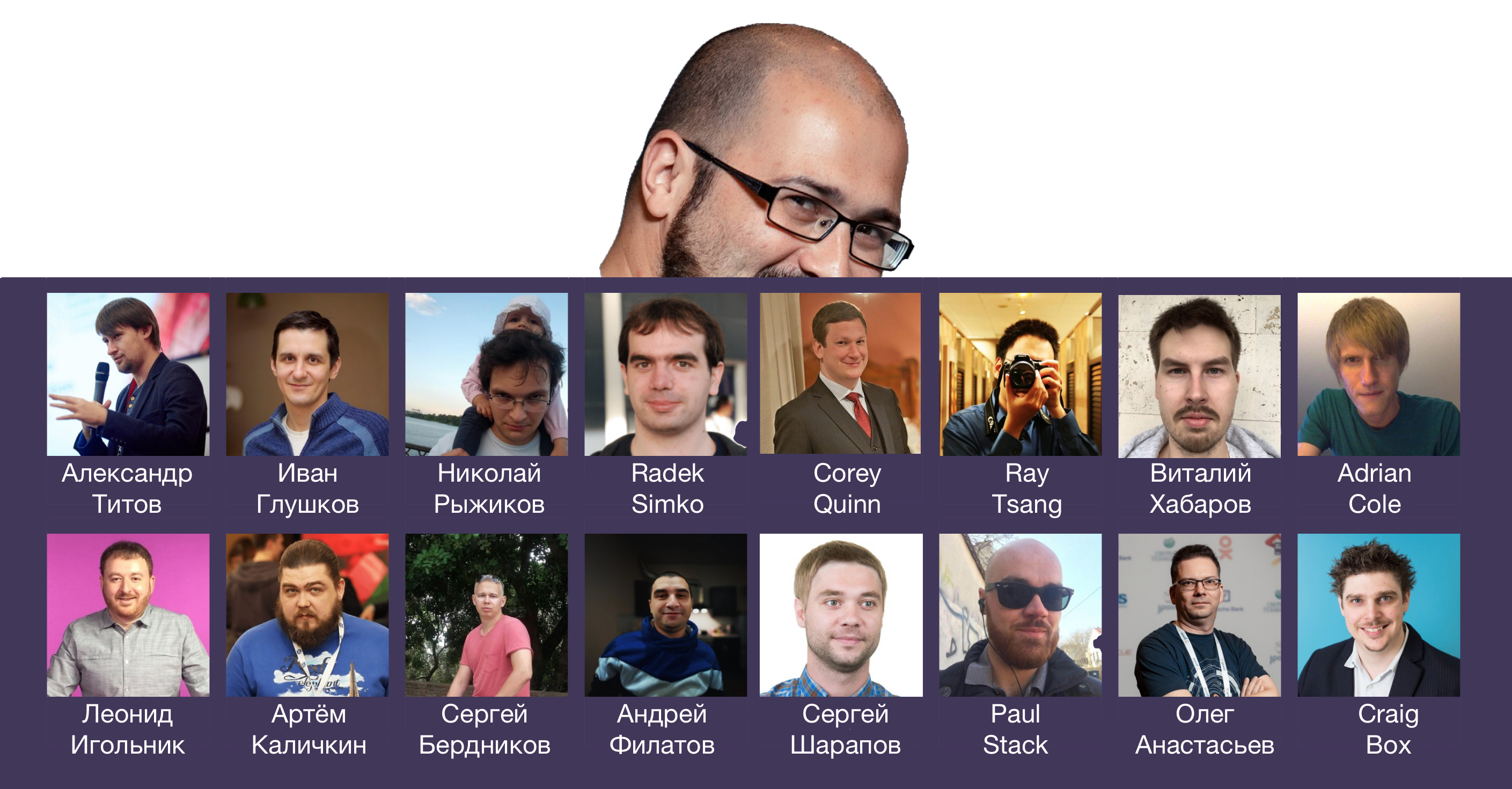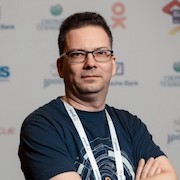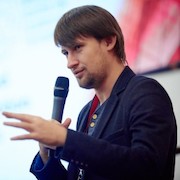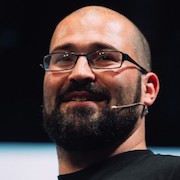DevOops 2017: report review

You can endlessly argue about the concept of "devops" - and you can once go to the conference and make an overall picture of the speeches of different people. And if you really do not want to stop arguing, then just there will be someone to do it!
Earlier we announced the DevOops conference and published an interview with its program committee. And now, when there are two weeks left before the conference and the program has been formed, it is time to talk about specific reports. What will the audience wait for in Petersburg on October 20? Much, from the nuances of Kubernetes to the Greek tragedy. Here is a list of topics, and reports corresponding to them are listed under the cut:
')
- Kubernetes
- Application Monitoring and Audit
- Continuous delivery
- Configuration management
- Clouds
- DevOps in general
- Baruch Sadogursky
Kubernetes
A couple of years ago, when you brought a seashell to your ear, you could hear the word “Docker”, because then it sounded all over. Now the containers themselves are no longer a novelty, but their orchestration has become a very discussed topic, and “Kubernetes” sounds everywhere. Here and on DevOops several reports will be connected with it at once.
 Ivan Glushkov - 10 reasons [not] to use k8s
Ivan Glushkov - 10 reasons [not] to use k8sOn the one hand, the report is intended to help those who still do not use Kubernetes to decide on this. On the other hand, those who already use it with might and main will also find something interesting for themselves: they will consider concrete “collected rakes” and developments that helped to cope with difficulties.
 Nikolai Ryzhikov - Expanding k8s
Nikolai Ryzhikov - Expanding k8sHere, as in the previous case, they will talk about some problems related to Kubernetes and how to fix them. But the matter is not limited to this tool by itself, Nikolai sees it in the big picture - and intends to show “the idiomatic way of building the final solution using Kubernetes, ThirdPartyResources and Operators (Custom Controllers) primitives”.
 Craig Box - Managing your microservices with Kubernetes and Istio
Craig Box - Managing your microservices with Kubernetes and IstioNo matter how you praise the transition from the monolith to microservices, it is impossible to deny: it not only simplifies life, but also complicates it. When there are a lot of independent components in the system, even to understand all their interactions is not easy - after all, they also need to be managed effectively. Craig Box will talk about how Kubernetes and Istio help together. The report will be available to all who have a general understanding of DevOps, but primarily designed for those who have already worked with containers and Kubernetes.
Application Monitoring and Audit
 Adrian Cole - Zipkin
Adrian Cole - ZipkinThe analysis of response time is a search for the culprit: because of what component did a noticeable delay arise for the user? With the flourishing of microservices, the circle of suspects has expanded, and it has become more difficult to be an “investigator”, but Zipkin can help. Adrian Cole will explain the theoretical part and show a small demo.
 Sergey Sharapov - SmartMonitoring - Business Logic Monitoring at Odnoklassniki
Sergey Sharapov - SmartMonitoring - Business Logic Monitoring at OdnoklassnikiIn Odnoklassniki, they face difficult situations - and often in such cases they are not content with known solutions, but create their own. As a result, the social network has a great expertise in such matters, which are ready to share. In this case, they will talk about creating their own monitoring system, which not only finds anomalies in the work of the portal, but also shows the links between them - making life easier for administrators and developers.
Continuous delivery
 Vitaliy Khabarov - Continuous Delivery in a Windows Environment
Vitaliy Khabarov - Continuous Delivery in a Windows EnvironmentIs there life on Mars and DevOps under Windows? Do people build Continuous Delivery in this environment in such a way as to remain satisfied with the result? If so, how? The answer to the first questions is in the affirmative: Vitaly's story will be based on the experience of successfully automating the launch of test environments with a Windows application server. And he will answer the third question deployed in the report.
 Paul Stack - Continuously delivering infrastructure to the cloud
Paul Stack - Continuously delivering infrastructure to the cloudNow Paul works at Joyent, but until recently he was an employee of HashiCorp - no wonder he knows the Packer and Terraform tools from this company. And on DevOops, the topic “continuously delivering infrastructure to the cloud” will be revealed using the example of their use. Our preliminary survey showed that many are waiting for this report.
A small disclaimer: Paul now has a little difficulty with a visa, but we believe that it will be resolved successfully in the near future. If all of a sudden it will affect the conference, the changes will immediately be reflected on the site.
Configuration management
 Andrei Filatov - Ensemble of salt cooks-puppeteers: compare Ansible, SaltStack, Chef and Puppet
Andrei Filatov - Ensemble of salt cooks-puppeteers: compare Ansible, SaltStack, Chef and PuppetWhat IT pros can do forever? Argue about which tool is better. But often it turns into a senseless and merciless holivar. In this report there will also be a comparison of similar tools - but much more constructive and balanced, and in relation to specific tasks, and not “in a vacuum”.
Clouds
 Radek Simko - Managing multiple clouds FTW
Radek Simko - Managing multiple clouds FTWWhich is better, AWS or Google Cloud? Of course, this depends on what it is for them to use: for different scenarios, the answer may differ. Moreover, these different scenarios can coexist in one big project, and this makes you think about the division of the load between different clouds. But sitting on two clouds can be even more difficult than on two chairs: it is necessary to solve a lot of questions so that all this harmoniously coexists. HashiCorp's Terraform helps solve these issues - and Radek Simko will tell you exactly how.
 Oleg Anastasyev - One-cloud: OS-level data center in Odnoklassniki
Oleg Anastasyev - One-cloud: OS-level data center in OdnoklassnikiAs mentioned above, Odnoklassniki often make their own decisions where others are standard. So here: while everyone uses Kubernetes and Mesos, they decided that it was better to make one’s own than to customize it to suit my needs. Oleg m0nstermind Anastasyev already briefly told us about this in an interview , and at the conference he would explain much more technical specifics. Would it be interesting to listen to people from small companies where a similar project is clearly not going to be started? The description of the report promises an answer to the question "can it be done so that Docker does not fall" - but at least theoretically you want everyone to know about this.
DevOps in general
Most of the conference reports analyze in detail a specific technical topic - this is an approach that is already well known to visitors of our other conferences. But in the case of DevOps, everything is somewhat different: this concept cannot simply be decomposed into a set of specific tools and practices. Therefore, there will be speeches showing the "big picture":
 Corey Quinn - Come scale
Corey Quinn - Come scaleCory Quinn, known for sending Last Week in AWS , saw a lot of DevOps reports in the spirit of "our infrastructure is a ray of light in the dark realm, and you and yours should retrain as an accountant." Seeing some of these "rays of light" from the inside, Corey realized that he strongly disagreed with this approach - and in the opening keynote of the conference, he intends to explain to everyone why everything is generally terrible, but you are fine.
 Alexander Titov - From sysadmin to man
Alexander Titov - From sysadmin to manUsually, when talking about DevOps, two colliding parties are remembered - administrators and developers with their different tasks and approaches. Alexander Titov remembers that in fact there is also a business side, and in the end, everything should have a good effect on its tasks. Therefore, his report will be “about DevOps as a system: how it helps a business, what competencies on the part of engineers should appear for DevOps, what business problems can be solved using the DevOps software production method, and what mistakes are possible on the way to DevOps production and how avoid or stop them. ”

 Sergey Berdnikov, Artyom Kalichkin - Success Story, or “Dev + DevOps + Ops”
Sergey Berdnikov, Artyom Kalichkin - Success Story, or “Dev + DevOps + Ops”Sometimes the situation “was smooth in the roadmap, but they forgot about the ravines”: ideas with which everything seems to be clear, when trying to embody them, run into a lot of unaccounted features. With DevOps, of course, it’s the same: when it starts to be used in an enterprise with long-established rules and habits, many difficulties suddenly come out. How much can DevOps practices be distorted in order to successfully implement them in such a situation and make everyone better? Sergey and Artyom will talk about their own experiences.
Baruch Sadogursky
As film critics joke, the participation of Tom Cruise turns any film (even comedy, even fiction) into a special genre “film with Tom Cruise”. With the well-known to many Baruch jbaruch Sadogursky (JFrog), about the same: because of his charisma, Baruch’s reports are also a separate genre. And since Baruch is an ardent supporter of DevOps, at this conference he will be a Stakhanovist, giving three presentations and conducting a round table. We have grouped descriptions of all his speeches:

 Baruh Sadogursky, Leonid Igolnik - Silicon Massacre Chainsaw (as I spent last weekend on duty)
Baruh Sadogursky, Leonid Igolnik - Silicon Massacre Chainsaw (as I spent last weekend on duty)As in his other reports on DevOops, Baruch will speak together - in this case, with Leonid Igolnik (developer from CA Technologies and a venture capitalist). Together, they will discuss "how to build the process of duty in such a way that it ceases to take place in the atmosphere of blood, flying limbs and smeared guts."

 Ray Tsang, Baruch Sadogursky - Troubleshooting & Debugging Production Applications in Kubernetes (aka The Failing Demo Talk)
Ray Tsang, Baruch Sadogursky - Troubleshooting & Debugging Production Applications in Kubernetes (aka The Failing Demo Talk)Baruch - developer advocate at JFrog, and a developer advocate for the Google Cloud Platform. Not surprisingly, their debugging report on Kubernetes applications will consider situations in which the Google Cloud Platform and the JFrog Artifactory can be relevant. But it is not only these projects that will be discussed: they will also talk about the built-in capabilities of Kubernetes itself.

 Baruch Sadogursky, Alexander Titov - Round table: How to “sell” DevOps to colleagues, superiors and other indifferent?
Baruch Sadogursky, Alexander Titov - Round table: How to “sell” DevOps to colleagues, superiors and other indifferent?There will be not a standard report, but a round table in which a number of conference speakers will take part. The circle of participants is now being clarified, and since this is not a rehearsed performance for a second, we ourselves do not fully know what it will look like. But when in the role of the leading Baruch, it is immediately obvious: you can expect anything but a boring bubnezh under your breath.

 Baruch Sadogursky, Leonid Igolnik - DevOps in scale: Greek tragedy in three acts
Baruch Sadogursky, Leonid Igolnik - DevOps in scale: Greek tragedy in three actsFinally, the conference will be closed by Keynout Baruch and Leonid Igolnik about what DevOps-difficulties arise as the company grows at different stages. There are three such stages - and the “Greek tragedy in three acts” turned out.
There are two organizational details that give an idea of how everything will be felt. Firstly, the speakers requested togas and other entourage, which helps to recreate the atmosphere of the Greek tragedy. Secondly, the audience was asked to have alcohol prepared for the party even during the break before this performance, and in a sense it opened the party. In general, at the end of the day, when it becomes difficult to perceive figures and graphs, there will be a performance with which there will obviously be no such problems.
Once the conference program is already fully known, there is no longer any reason to postpone the decision to “go for it”. It's time to decide - and if you are interested in the descriptions, contact the DevOops site for a ticket. We are waiting for everyone on October 20 in St. Petersburg (and those who are to St. Petersburg in any way, are waiting for the online broadcast among the viewers).
Source: https://habr.com/ru/post/339418/
All Articles